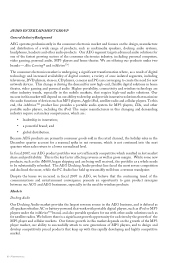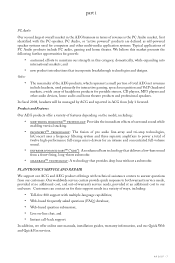Plantronics 2007 Annual Report Download - page 20
Download and view the complete annual report
Please find page 20 of the 2007 Plantronics annual report below. You can navigate through the pages in the report by either clicking on the pages listed below, or by using the keyword search tool below to find specific information within the annual report.
16 P l a n t r o n i c s
Item 1A. Risk Factors
Investors or potential investors in our stock should carefully consider the risks described below. Our stock
price will reflect the performance of our business relative to, among other things, our competition,
expectations of securities analysts or investors, and general economic market conditions and industry
conditions. One should carefully consider the following factors in connection with any investment in our
stock. Our business, financial condition and results of operations could be materially adversely affected if
any of the following risks occur. Should any or all of the following risks materialize, the trading price of
our stock could decline, and investors could lose all or part of their investment.
Our operating results are difficult to predict and fluctuations may cause volatility in the trading price of
our common stock.
Given the nature of the markets in which we compete, our revenues and profitability are difficult to
predict for many reasons, including the following:
• Our operating results are highly dependent on the volume and timing of orders received during
the quarter, which are difficult to forecast. Customers generally order on an as-needed basis,
and we typically do not obtain firm, long-term purchase commitments from our customers.
As a result, our revenues in any quarter depend primarily on orders booked and shipped in that
quarter;
• We must incur a large portion of our costs in advance of sales orders because we must plan
research and production, order components and enter into development, sales and marketing,
and other operating commitments prior to obtaining firm commitments from our customers. In
the event we acquire too much inventory for certain products, the risk of future inventory write-
downs increases. In the event we have inadequate inventory to meet the demand for particular
products, we may miss significant revenue opportunities or may incur significant expenses such
as air freight, expediting shipments, and other negative variances in our manufacturing processes
as we attempt to make up for the shortfall. When a significant portion of our revenue is derived
from new products, forecasting the appropriate volumes of production is even more difficult;
• In the ACG segment, our prices and gross margins are generally lower for sales to Business-
to-Consumer (“B2C”) customers compared to sales to our Business-to-Business (“B2B”)
customers. In addition, our prices and gross margins can vary significantly by product line as
well as within product lines. Therefore, our profitability depends, in part, on the mix of our
B2B to B2C customers as well as our product mix. In the AEG segment, our prices and gross
margins are generally lower for our PC Audio products than our Docking Audio products.
Therefore, our profitability depends, in part, on our mix of PC Audio to Docking Audio
products. For example, in the fourth quarter of fiscal 2007, sales of Docking Audio products
declined substantially, resulting in lower gross margins and increased operating losses. The size
and timing of opportunities in these markets are difficult to predict;
• We are working to refresh virtually the entire AEG product line; however, market adoption of
new products is difficult to predict;
• A significant portion of our annual retail sales for AEG generally occur in the third fiscal
quarter, thereby increasing the difficulty of predicting revenues and profitability from quarter to
quarter and in managing inventory levels;
• Fluctuations in currency exchange rates impact our revenues and profitability because we report
our financial statements in U.S. dollars, whereas a significant portion of our sales to customers
are transacted in other currencies, particularly the Euro. Furthermore, fluctuations in foreign
currencies impact our global pricing strategy resulting in our lowering or raising selling prices in
a currency in order to avoid disparity with U.S. dollar prices and to respond to currency-driven
competitive pricing actions; and
























